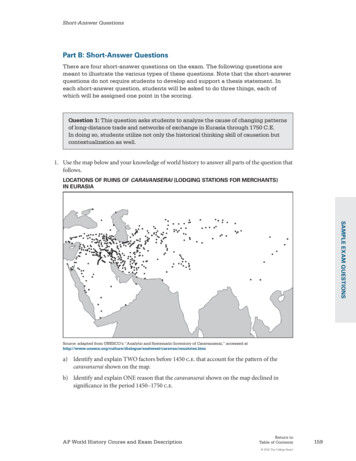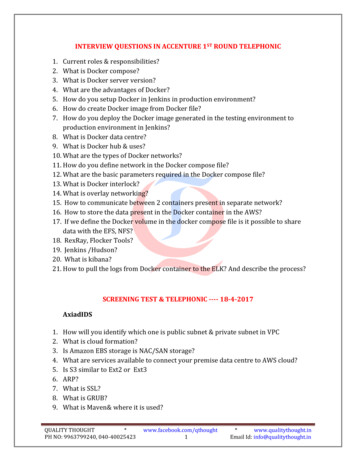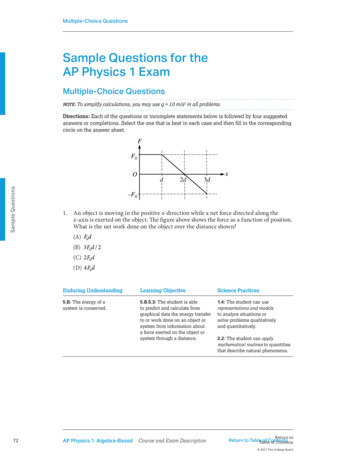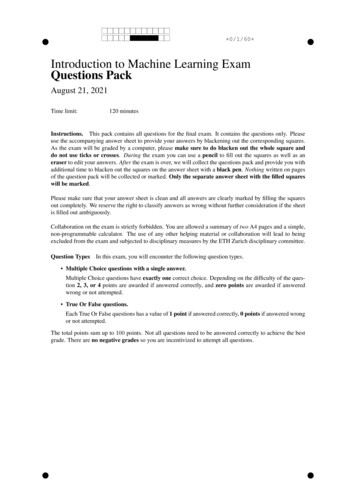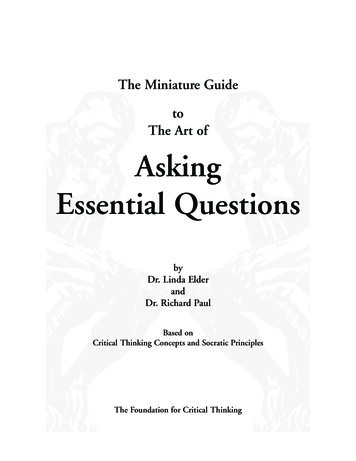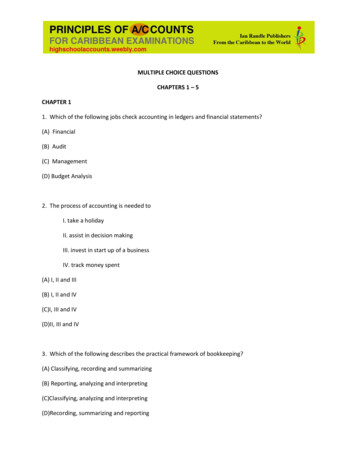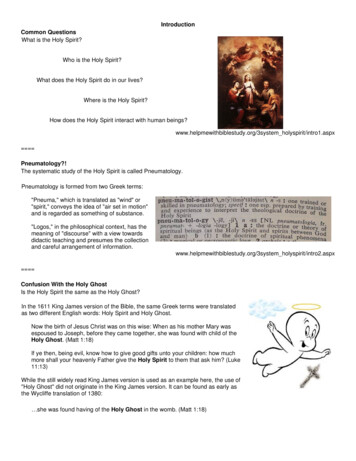
Transcription
IntroductionCommon QuestionsWhat is the Holy Spirit?Who is the Holy Spirit?What does the Holy Spirit do in our lives?Where is the Holy Spirit?How does the Holy Spirit interact with human beings?www.helpmewithbiblestudy.org/3system holyspirit/intro1.aspx Pneumatology?!The systematic study of the Holy Spirit is called Pneumatology.Pneumatology is formed from two Greek terms:"Pneuma," which is translated as "wind" or"spirit," conveys the idea of "air set in motion"and is regarded as something of substance."Logos," in the philosophical context, has themeaning of "discourse" with a view towardsdidactic teaching and presumes the collectionand careful arrangement of information.www.helpmewithbiblestudy.org/3system holyspirit/intro2.aspx Confusion With the Holy GhostIs the Holy Spirit the same as the Holy Ghost?In the 1611 King James version of the Bible, the same Greek terms were translatedas two different English words: Holy Spirit and Holy Ghost.Now the birth of Jesus Christ was on this wise: When as his mother Mary wasespoused to Joseph, before they came together, she was found with child of theHoly Ghost. (Matt 1:18)If ye then, being evil, know how to give good gifts unto your children: how muchmore shall your heavenly Father give the Holy Spirit to them that ask him? (Luke11:13)While the still widely read King James version is used as an example here, the use of"Holy Ghost" did not originate in the King James version. It can be found as early asthe Wycliffe translation of 1380: she was found having of the Holy Ghost in the womb. (Matt 1:18)
Confusion With the Holy Ghost (continues)Why the translation "Holy Ghost" was introduced is debated among scholars. Did early translators believe that the "spiritof God the Father" of the Old Testament and in the New Testament should be translated as the "Holy Spirit"; but, when inreference of the third person of the Trinity, translate as "Holy Ghost"?Nevertheless, the Holy Ghost is the same and equivalent in meaning to the Holy Spirit, and today’s contemporary Bibletranslations do not use the phrase "Holy Ghost".www.helpmewithbiblestudy.org/3system holyspirit/intro3.aspx DistinctionsCompared to the Holy Spirit, the human spirit is not a separate entity fromthe human being. Human beings are comprised of two parts: a physicalbody and a spirit. In contrast, the Spirit of God is an entity by Itself withouta physical body (Ezek 36:25-28; John 14:26).Compared to the Holy Spirit, angels are similar in that they are both spiritbeings without a physical body; however, the Holy Spirit is not a type ofangel nor created as angels were.The phrase "the Angel of the Lord" is not a type of angel; instead it is a titlereserved for the pre-incarnate form of Jesus Christ.www.helpmewithbiblestudy.org/3system holyspirit/intro4.aspx Take the Quiz!1. The Holy Ghost is.a. Holy Gost in Middle Englishb. Holy Spiritc. Third Person of the Trinityd. All of the aboveThe answer is "d"! The Holy Ghost is spelled "Holy Gost" in Middle English, is exactly the same as "Holy Spirit", and isthe third Person of the Trinity!2. Is the Holy Spirit to God as the human spirit is to man?a. Yesb. NoThe answer is “b”. Whereas a human being is comprised of a body and a spirit, God is not comprised in like manner;the Holy Spirit is a person by Himself. The Holy Spirit, as part of the Trinity, is not apart from God.3. Is the Holy Spirit a spirit being like a created angelic being?a. Yesb. NoThe correct answer is "b"; you know the distinction!4. Is the Holy Spirit the Angel of the Lord?a. Yesb. NoThe correct answer is “b”. The Angel of the Lord is Jesus Christ!www.helpmewithbiblestudy.org/3system holyspirit/intro5.aspx
Divine Personal BeingIs DivineWhat evidence is there for the deity of the Holy Spirit?The Holy Spirit is seen as the Spirit of God (Gen 1:2; 1 Cor 3:16).The Holy Spirit is seen as the Spirit of Jesus Christ (Acts 16:7; Gal 4:6; 1Pet 1:11).The Holy Spirit is seen as distinct from God and Jesus Christ (John14:26; John 15:26; John 16:7-14).The Holy Spirit has qualities of God:All knowing with infinite awareness, understanding and insight (Isa 40:13-14; 1 Cor 2:10-11).Present everywhere at the same time and simultaneously in all Believers (Ps 139:7-10; 1 Cor 6:19-20).All powerful with unlimited power (Job 33:4; Rom 15:18-19).Eternal (Heb 9:14).When the Holy Spirit is described as the seven Spirits of God, it is in the context of an individual Being (Zech 4:1-10),comprised of seven individual entities (Rev 4:5), a part of God and omnipresent, and possessed by Jesus Christ (Rev5:6).www.helpmewithbiblestudy.org/3system holyspirit/divine1.aspx Part of the Triune Nature of GodThe Holy Spirit is distinguished among persons of the Trinity.Jesus distinguishes the Holy Spirit from God and Himself (John14:16; John 15:26; John 16:7).The apostles distinguishes the Holy Spirit from God and Jesus (Matt3:16-17; 28:19; Rom 15:16; 2 Cor 1:21-22; 2 Cor 13:14; Eph 3:1417; 2 Thess 2:13-14; 1 Pet 1:2).There is a hierarchy in the functional roles that each Person of the Trinityplay.The Father sent the Son whose purpose was to reveal the Father. The Son sent the Spirit whose purpose was toreveal the Son.James Packer portrays another perspective, "God the Father is the giver of the Holy Scripture; God the Son is thetheme of Holy Scripture; and God the Spirit is the author, authenticator, and interpreter, of Holy Scripture."But there is no hierarchy in the nature of each Person of the Trinity.In nature, they are equal in divinity, divine source and essential for the activities of God.www.helpmewithbiblestudy.org/3system holyspirit/divine2.aspx
A PersonIs the Holy Spirit simply a spirit or essence of God? Or does the Holy Spirit have characteristics of a person?To be considered a person, the Holy Spirit must have 3 characteristics: 1) intelligence and moral knowledge, 2)emotion, and 3) volitional will.The Bible explicitly indicates that the Holy Spirit has moral knowledge and intelligence:He can teach (John 14:26).He approves of some activities (Acts 15:28) and forbids or disallows others (Acts 16:67).The Holy Spirit experiences emotions such as being grieved (Isa 63:10; Eph 4:30):The Holy Spirit demonstrates that He has a will. Not only does the Holy Spirit exhibits thecharacteristics of a person, He is referred to with personal pronouns. Called a "Helper,""Counselor" or "Comforter," the Bible explicitly describes the Holy Spirit as a person whointentionally helps and comforts Believers (John 14:16, 26; 15:26; 16:7).He can intercede and pray for human beings (Rom 8:26-27).He distributes gifts (1 Cor 12:11).www.helpmewithbiblestudy.org/3system holyspirit/divine3.aspx Take the Quiz!1. What God qualities does the Holy Spirit have?a. Omniscient and omnipotentb. Invisiblec. Present everywhered. Only "a" and "c"e. All of the aboveThe correct answer is “d”. The Holy Spirit has the divine qualities of omniscience, omnipotence, and omnipresence(present everywhere).2. The Holy Spirit is distinguishable among the Persons of the Trinity.a. Trueb. FalseThe correct answer is “a”. The Holy Spirit is a distinct person within the Trinity.3. The Holy Spirit a spirit being which is why it is lesser in nature than God and Jesus.a. Trueb. FalseThe correct answer is “b”. Each Person of the Trinity is equal in nature. A hierarchy exists in the functional role eachplays.
Take the Quiz! (continues)4. What characteristics does the Holy Spirit have that qualifies Him as a Person?a. Moral knowledge, emotion, and obeys Godb. Intelligence, emotion, and intentionalc. Moral knowledge, without emotion or prejudice, and a willd. Programmed, emotion, and willfulThe correct answer is “b”. The qualities that determine if one is a person are intelligence / moral knowledge, emotionand a will (intentional).www.helpmewithbiblestudy.org/3system holyspirit/divine4.aspx His Work for GodSpectacular WorksThe Bible records the Holy Spirit as participating in all of the significantacts of God.The Holy Spirit was involved with Creation (Gen 1:1-2).The Holy Spirit was involved with the creation of man (Gen 1:26-27;2:7).The Holy Spirit was involved with the inspiration of the Bible (Acts1:16; 28:25; 2 Pet 1:20-21).The Holy Spirit was involved with the conception of Jesus (Matt 1:1820; Luke 1:30-35).The Holy Spirit was with Jesus during His temptation in the wilderness (Luke 4:1-2).The Holy Spirit was present during the atonement of Jesus Christ (Heb 9:13-14).The Holy Spirit was involved with the resurrection of Jesus Christ (Rom 8:11).www.helpmewithbiblestudy.org/3system holyspirit/worksForGod1.aspx Activity in the Life of JesusAs seen earlier, the Holy Spirit was involved with the conception of Jesus, His temptation inthe wilderness, His death and resurrection. The Holy Spirit was also intimately involved withJesus' ministry.Jesus attributed the source of His authority to the Holy Spirit (Luke 4:16-21).The Holy Spirit was in Jesus' being and annointed Him with supernatural power (Acts10:38; Luke 4:18).As Jesus preaches the Good News, He indicates that one must have the Holy Spirit toenter the kingdom of God (John 3:5).www.helpmewithbiblestudy.org/3system holyspirit/worksForGod2.aspx
Activity in the Life of the Old Testament ManBefore Jesus was born, the Holy Spirit was active in the life of man in a variety of ways assome of these examples show.The Holy Spirit sustained life (Gen 6:3; Job 34:14-15).The Holy Spirit spoke through various people such as prophets of Israel (Isa 59:21; Zech7:12), a warrior (1 Chron 12:18), and a pagan prophet (Num 24:2, 4).The Holy Spirit brought the power of God (Judg 14:6).The Holy Spirit provided knowledge (Ex 35:31-35).www.helpmewithbiblestudy.org/3system holyspirit/worksForGod3.aspx Take the Quiz!1. What are some of the divine works that the Holy Spirit was involved with?a. The Holy Spirit was involved with Creation and the creation of manb. The Holy Spirit was involved with the conception of Jesus, His temptation in the Wilderness, His crucifixion and HisResurrectionc. The Holy Spirit inspired Moses with the writing of the first five books of the Bibled. Only "a" and "b"e. All of the aboveThe correct answer is “d”. Good for you! You remembered that God spoke directly to Moses in the writing of thePentateuch (Ex 19:9; 29:42; 33:9).2. Because Jesus is God, He does not need the Holy Spirit to be the source of His authority.a. Trueb. FalseThe correct answer is “b”. Jesus Himself attributed the source of His authority to the Holy Spirit (Luke 4:16-21).3. The Holy Spirit sustains life.a. Trueb. FalseThe correct answer is “a”. The Holy Spirit sustained life (Gen 6:3; Job 34:14-15).www.helpmewithbiblestudy.org/3system holyspirit/worksForGod4.aspx In the Believer / ChurchThe New CovenantThroughout the Old Testament, the Holy Spirit would come upon people, depart, and never stay with the individual (Num11:25-29; 1 Sam 16:14).
The New Covenant (continues)When God makes the unconditional New Covenant, He promises:. this is My covenant with them, .My Spirit which is upon you, and My words which I have put in your mouth shallnot depart from your mouth,. (Isa 59:21)I will put My Spirit within you and cause you to walk in My statutes, and you will be careful to observe My ordinances.(Ezek 36:25-28)God promises the indwelling of the Holy Spirit!When Jesus arrives, He provides some additional information about the NewCovenant:He who believes in Me, as the Scripture said, "From his innermost beingwill flow rivers of living water." But this He spoke of the Spirit, whom thosewho believed in Him were to receive; for the Spirit was not yet given,because Jesus was not yet glorified. (John 7:38-39)And behold, I am sending forth the promise of My Father upon you; but you are to stay in the city until you are clothedwith power from on high. (Luke 24:49)But when He, the Spirit of truth, comes, He will guide you into all the truth; for He will not speak on His own initiative,but whatever He hears, He will speak; and He will disclose to you what is to come. (John 16:13)Faith in Jesus Christ initiates the New Covenant and the Believer receives the Holy Spirit who is the guideinto a deeper understanding of God and His promises!After the resurrection of Jesus Christ, the apostles elaborate further on what God intended with the Holy Spirit in thecontext of the New Covenant:In Him, you also, after listening to the message of truth, the gospel of your salvation—having also believed, you weresealed in Him with the Holy Spirit of promise, who is given as a pledge of our inheritance, with a view to theredemption of God's own possession, to the praise of His glory. (Eph 1:13-14)In ancient times, clay was used to seal a scroll to preserve the authenticity of its contents. In a similar manner, theHoly Spirit validates a genuine Believer. For the Believer, the Holy Spirit is God's pledge or assurance that Hispromised inheritance will come true!www.helpmewithbiblestudy.org/3system holyspirit/inTheBeliever1.aspx Salvation from the Penalty of SinThus the gift of the Holy Spirit, as God promised in the New Covenant (Isa 59:21;Ezek 36:25-28), becomes an agent of sanctification.The Holy Spirit sanctifies by washing the heart and renewing the mind (Tit 3:4-7).The Holy Spirit sanctifies by assuring the Believer of the indwelling presence ofJesus Christ (Acts 16:6-7; Phil 1:19; 1 Pet 1:11).The Holy Spirit sanctifies by helping the Believer understand the Scriptures (1Cor 2:10-16; Eph 3:3-6).The Holy Spirit sanctifies by attesting to the reality of Believer's faith, brands theBeliever as a property of God's, and guarantees his inheritance in the futurecompletion of salvation (2 Cor 1:21-22; 5:5).www.helpmewithbiblestudy.org/3system holyspirit/inTheBeliever2.aspx
Distinction: Indwelling vs BaptismThe indwelling of the Holy Spirit at the time of regeneration issometimes confused with the "baptism of the Holy Spirit." Whatis the difference?Indwelling of the Holy Spirit occurs at the time when onecomes to faith."Baptism of the Holy Spirit" can occur at the moment ofgenuine faith or in Believers some time after regeneration.When the "baptism of the Holy Spirit" took place with theapostles (Acts 2:1-4), it was an event that occurred after their regeneration. When the "baptism of the Holy Spirit" tookplace with the Gentiles (Acts 10:44-46), it was an event that occurred at the time of regeneration.All Believers experience the indwelling of the Holy Spirit, and the Spirit does not depart from the Believer.In contrast, there is no clear biblical evidence that all Believers experience the "baptism of the Holy Spirit," and when itdoes occur, it is temporary.www.helpmewithbiblestudy.org/3system holyspirit/inTheBeliever3.aspx Salvation from the Power of SinHow does the Holy Spirit help the Believer live a sanctified life devoted and dedicatedto God?1. Formerly alienated, blind and deaf to God, the Believer with the Holy Spiritrealizes the reality of God's presence and reality of his relationship to God (Gal4:6-7).2. While a Believer's sinful nature remains, the Holy Spirit provides the power thatenables the Believer freedom from the obligation to live according to his sinfulnature (Rom 8:12-13; Gal 5:16-18).3. The Holy Spirit provides the possibility of salvation from the power of sin; but, itis limited by the degree that the Believer "lives by the Spirit" or "led by the Spirit"(Gal 5:16-18; Zech 4:6).For example, the "fruit of the Spirit" is the natural product of the Holy Spirit when there is a living relationshipbetween God and the Believer (Gal 5:22-25). The nine different qualities of love, joy, peace, patience, kindness,goodness, faithfulness, gentleness and self-control are considered a singular unit and pertain to one's relationshipwith God, his fellow man and himself.Because He produced the Bible (1 Pet 1:21), the Holy Spirit helps one understand God's word (1 Cor 2:10-16;Eph 3:3-6) and educates (Tit 3:4-7) or confronts (Eph 6:18); however, it is through one's efforts of "living by theSpirit" and "following the lead of the Spirit" whether the fruit of the Spirit is achieved (Gal 5:25).4. The Holy Spirit helps sustain Believers during burdens and disappointments through intercession and prayer (Rom8:26-27). It is why Believers are exhorted to pray "in the Sprit" (Eph 6:18).www.helpmewithbiblestudy.org/3system holyspirit/inTheBeliever4.aspx
Caring for the Salvation of OthersIn making all Believers one by the Spirit 1 Cor 12:13), theHoly Spirit serves a unifying function in bringing Believerstogether (2 Cor 13:14; Philip 2:1-2) for the singular purposeof serving God (1 Cor 12:27; Eph 2:19-22).To this community of Believers, the Holy Spirit bestowsspiritual gifts (1 Cor 12:1-11) for the purpose of edifyingand promoting spiritual maturity (1 Cor 14:12-11) andall for the glory of God (1 Pet 4:10-11).Spiritual GiftsAdministrationDistinguishing tTeacher / TeachingWisdomApostle / torServiceTongues / InterpretationIn this context, serving God is caring about thesalvation of others whether it is salvation from thepenalty of sin or salvation from the power of sin.www.helpmewithbiblestudy.org/3system holyspirit/inTheBeliever5.aspx Take the Quiz!1. If it wasn't for the New Covenant, the Holy Spirit would come and depart upon man.a. Trueb. FalseThe correct answer is “a”. You knew that the indwelling of the Holy Spirit was a promise God made in the NewCovenant.2. How does the Holy Spirit sanctify the New Believer?a. Cleanses the only necessary component of the human being, the mindb. Assures the Believer the indwelling presence of Jesus Christc. The Holy Spirit is the author of Scriptured. Indwelling of the Holy Spirit is not necessary for salvationThe correct answer is “b”. The Holy Spirit sanctifies by assuring the Believer of the indwelling presence of JesusChrist (1 John 3:24).3. What is required before the Holy Spirit can help the Believer live a sanctified life devoted and dedicated to God?a. You must be "baptized by the Holy Spirit"b. You must be yourselfc. You must be supernaturally empowered so that you can be like God knowing good from evild. The Holy Spirit can only help if the Believer cooperates and follows His leadThe correct answer is “d”!4. How does a Believer know that the Holy Spirit is working in his life?a. The nine characteristics of the Fruit of the Spirit is evidentb. You recognize and exercise your spiritual giftc. You are being used to edify and bless others in your churchd. All of the aboveThe correct answer is “d”!www.helpmewithbiblestudy.org/3system holyspirit/inTheBeliever6.aspx
ConclusionCooperating with the Holy SpiritBecause of God's lovingkindness and fidelity to His covenant, the Holy Spirit regenerates, sanctifies and indwells in allthose who have a genuine faith in Jesus Christ and His work of atonement.In bestowing His Helper, God provides the Holy Spirit as His teacher of how to be holy (John 14:26).For who among men knows the thoughts of a man except the spirit of the man which is in him? Even so the thoughtsof God no one knows except the Spirit of God. Now we have received, not the spirit of the world, but the Spirit who isfrom God, so that we may know the things freely given to us by God, which things we also speak, not in words taughtby human wisdom, but in those taught by the Spirit, combining spiritual thoughts with spiritual words. (1 Cor 2:11-13)As you seek to cooperate with the Holy Spirit by praying for His leading and listening for His voice, don't forget the surestway of receiving His direction and instruction - namely through Bible study and Scripture memory.The words of the Bible are the words of God's Spirit.This book of the law shall not depart from your mouth, but you shall meditate on it day and night, so that you may becareful to do according to all that is written in it; for then you will make your way prosperous, and then you will havesuccess. (Josh 1:8)In reading the Bible soundly and memorizing His words, you minimize the risk of listening to the wrong voices andabstracting the plain meaning of Holy Spirit's words.www.helpmewithbiblestudy.org/3system holyspirit/conclusion.aspx
The Holy Spirit was involved with the inspiration of the Bible (Acts 1:16; 28:25; 2 Pet 1:20-21). The Holy Spirit was involved with the conception of Jesus (Matt 1:18-20; Luke 1:30-35). The Holy Spirit was with Jesus during His temptation in the wilderness (Luke 4:1-2). The Holy Spirit was present during the atonement of Jesus Christ (Heb 9:13-14).



